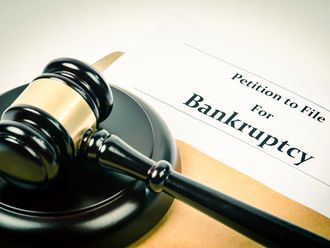With the rise, spread and eventual paroxysm in global markets that the Greek debt crisis induced, a larger debate in academic circles and on trading desks have begun to emerge.
Is America's looming debt burden making it similar to Greece? That the world's only hyper-power could be compared to a middling republic at the edges of Europe might seem an irrelevant question to many.
Yet, expanding empires and their influences have dwindled due to a curious coming together of rising debt levels, suspect values in currency, lack of productive opportunities for internal employment and the emergence of a political class that values strategic extremism.
At various stages during the past two years America has seemed to be afflicted by one, if not all, of the aforementioned characteristics.
Critical issue
The most recent debate has centred around the critical issue of US debt and deficit and its ability to facilitate a critical macroeconomic crisis.
There are two schools who argue, despite some agreements, about the consequences of the present macroeconomic path.
There is a third, less frequently heard, apolitical and yet perhaps most consequential argument from a markets and trading desk perspective as well.
The first, which is most prominently associated with the conservatives, are alarmed about the levels of debt. They argue, that the American debt is at unsustainable levels.
Using projections well into two decades further out, they argue that the federal debt is projected to be about 140 per cent of US GDP.
Add to this the debt burden of state governments, municipalities and individuals and very soon we are headed into an underworld of financial markets where thumb rules by which individuals and governments run their affairs stop making sense.
Crash of the dollar
And conventional policy prescriptions seem anaemic. The only recourse then, they argue, is for the dollar to crash.
For neither will a combination of budget cuts and tax increases be politically feasible. In the end, debt will undo America.
The second argument, presented by more liberal economists, is that unlike Greece, the US will enjoy the fruits of economic recovery.
While America has a deficit and debt crisis at hand, and an aggravating one at that, America has two fundamental advantages.
One is its ability to export a more diverse set of products which allows for, despite an uneven economic recovery, reduction in trade and, perhaps, budgetary deficits.
Furthermore, claims from programmes such as the new health care reform bill are that long term costs will be reduced.
The second critical argument is that, unlike Greece, America doesn't have to live with an overvalued domestic currency.
The Greeks, with respect to their own productive and exporting capacities, find that the Euro is a forbiddingly overvalued currency to be playing with.
Difficult to compete
Given their low capital productivity, an already expensive currency makes it harder for them to compete.
In contrast, the Americans have the ability to print their own money and if need be, exert sufficient pressure on the rest of the world to follow through on a bilateral agreement on a dollar devaluation.
The Plaza Accords of the late 1980s were a direct result of such negotiations when the dollar devalued intentionally against the yen.
One of the unspoken arguments is that given the fact that the dollar is seen as a de facto store of value globally, devaluation of the dollar reduces the real commitments by the American state to future obligations.
So, this school of thought argues that debt is a problem, but nothing too dramatic compared to Greece.
From a trading desk however, neither arguments matter.
A "black swan" event, like a weaker than usual US Treasury auction induced by concerns over American debt, can result in a rippling tidal wave of capital movements.
Trading desks, unlike economists, don't have the luxury of neat theories and rational agent models.
Aware of this "outlier" scenario, increasingly, being irrationally afraid seems to be the rationally brave thing to do.
The columnist works for a major European investment bank in New York City. You can follow his tweets at: http://twitter.com/ks1729












